

It’s All Your Fault: High Conflict People
TruStory FM
Hosted by Bill Eddy, LCSW, Esq. and Megan Hunter, MBA, It’s All Your Fault! High Conflict People explores the five types of people who can ruin your life—people with high conflict personalities and how they weave themselves into our lives in romance, at work, next door, at school, places of worship, and just about everywhere, causing chaos, exhaustion, and dread for everyone else.
They are the most difficult of difficult people — some would say they’re toxic. Without them, tv shows, movies, and the news would be boring, but who wants to live that way in your own life!
Have you ever wanted to know what drives them to act this way?
In the It’s All Your Fault podcast, we’ll take you behind the scenes to understand what’s happening in the brain and illuminates why we pick HCPs as life partners, why we hire them, and how we can handle interactions and relationships with them. We break down everything you ever wanted to know about people with the 5 high conflict personality types: narcissistic, borderline, histrionic, antisocial/sociopath, and paranoid.
And we’ll give you tips on how to spot them and how to deal with them.
They are the most difficult of difficult people — some would say they’re toxic. Without them, tv shows, movies, and the news would be boring, but who wants to live that way in your own life!
Have you ever wanted to know what drives them to act this way?
In the It’s All Your Fault podcast, we’ll take you behind the scenes to understand what’s happening in the brain and illuminates why we pick HCPs as life partners, why we hire them, and how we can handle interactions and relationships with them. We break down everything you ever wanted to know about people with the 5 high conflict personality types: narcissistic, borderline, histrionic, antisocial/sociopath, and paranoid.
And we’ll give you tips on how to spot them and how to deal with them.
Episodes
Mentioned books
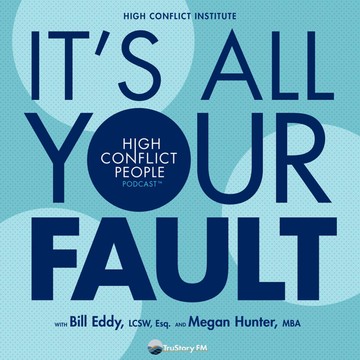
Oct 13, 2022 • 18min
What is the High Conflict Personality Theory?
Explore the theory of high conflict personalities with Bill Eddy, focusing on patterns of behavior like blaming others and extreme emotions. Understand the importance of behavior-focused approaches in dealing with individuals with high-conflict traits. Learn about the challenges in diagnosing personality disorders and effective strategies for managing interactions without labels.
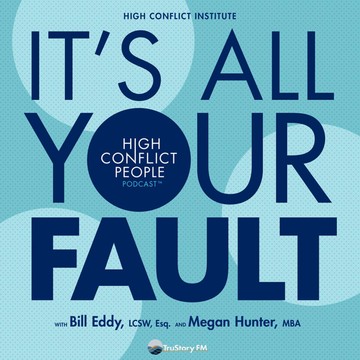
Oct 6, 2022 • 23min
When to Stop Trying with Someone with a High Conflict Personality
When dealing with high conflict personalities, knowing when to stop trying is crucial. Recognize signs like overreacting or feeling overwhelmed. Setting boundaries and disengaging with empathy are key strategies. The podcast provides valuable insights on navigating relationships with such individuals.
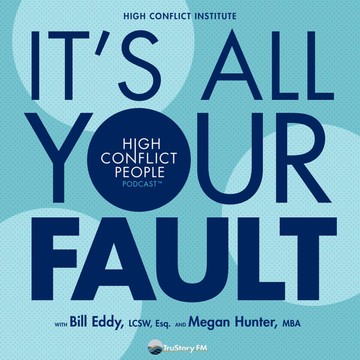
Sep 22, 2022 • 44min
Parental Alienation in Divorce with Dr. Amy J.L. Baker, Part 2
High conflict divorce and separation in the family courts consumes the majority of the courts’ time and resources and provides the most frustration and confusion. This is the second of a two-part episode with Dr. Amy J.L. Baker in our new High Conflict Divorce series, in which we interview leading experts from the high conflict divorce world – attorneys, counselors, custody evaluators, researchers, mediators and those within the courts themselves. In this episode Dr. Amy J.L. Baker, parental alienation expert and author of 9 books, including Co-parenting with a Toxic Ex; The High-Conflict Custody Battle; and Adult Children of Parental Alienation Syndrome will talk with Bill and Megan about:Whether favored parents ever recognize that they’re doing itParental alienation vs. parental estrangement Recommendations for lawyers when a child resists or refuses contactTips for what can be done in mild, moderate, severe casesTips for lawyers and therapistsTips for parents and grandparentsPrograms that can help reconnect a child with a rejected parentLinks & Other NotesWEBSITESDr. Baker’s Websitehttps://www.amyjlbaker.com/New Ways for Familieshttps://www.highconflictinstitute.com/new-ways-for-familiesTurning Points for Familieshttps://www.turningpointsforfamilies.com/BOOKSCo-Parenting with a Toxic Exhttps://www.amazon.com/gp/product/1608829588Adult Children of Parental Alienation Syndromehttps://www.amazon.com/gp/product/0393705196The High-Conflict Custody Battlehttps://www.amazon.com/The-High-Conflict-Custody-Battle-Accusations/dp/1626250731OTHEROur website: https://www.highconflictinstitute.com/Submit a Question for Bill and MeganBooks: all of our books can be found in our online store or anywhere books are sold.You can also find these show notes at our site.Note: We are not diagnosing anyone in our discussions, merely discussing patterns of behavior.
(00:00) - Welcome to It's All Your Fault
(01:25) - Adult Children and Alienation
(04:16) - Advice
(09:31) - Recognizing You're Alienating
(13:19) - Personality Disorders and Labels
(16:37) - Evolving the Term
(21:47) - Added to the DSM?
(24:23) - Treatment
(28:32) - Therapists
(34:32) - Lawyers
(36:24) - Parents
(38:53) - Cutting Off Contact
(41:09) - Wrapping Up
(42:18) - Reminders & Coming Next Week: Part 2 of our High Conflict Divorce series
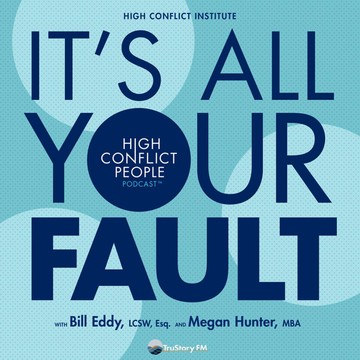
6 snips
Sep 15, 2022 • 28min
Parental Alienation in Divorce with Dr. Amy J.L. Baker, Part 1
Dr. Amy J.L. Baker, a nationally recognized authority on parental alienation and author of nine insightful books, tackles the challenging dynamics of high-conflict divorces. She defines parental alienation and highlights its prevalence and causes, drawing distinctions from estrangement. The discussion dives into how adult children of alienated parents navigate relationships later in life and offers vital strategies for parents facing alienation. Dr. Baker emphasizes the importance of understanding the emotional toll on families and the role of court systems in addressing these complex issues.
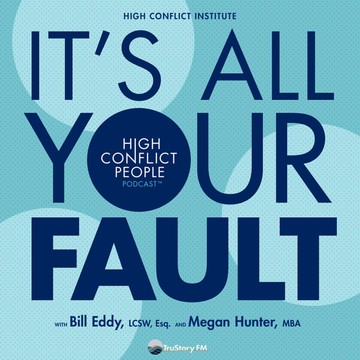
Sep 8, 2022 • 43min
REBROADCAST: Domestic Violence in Family Law: Part 1
REBROADCASTDomestic ViolenceMegan and Bill are joined by the Honorable Karen Adam and Annette Burns to discuss domestic violence. This is part one of this conversation.Links & Other NotesTHE VIDEO THAT WAS DISCUSSED IN THE EPISODEConversations About Domestic Violence in Family Law with 16 ExpertsBIOSBios for Bill Eddy, LCSW, Esq., Honorable Karen Adam, and Annette Burns, J.D.DOMESTIC VIOLENCE EXPERTS INTERVIEWED IN THE VIDEOAbi Ajibolade, Executive Director, The Redwood, Toronto, OntarioAmy G. Applegate, JD, Clinical Professor of Law, Maurer School of Law, Indiana University, Bloomington, IndianaLinda Bortell, PsyD, Clinical Psychologist, Bortell Psychological, Inc., Los Angeles, CaliforniaMelissa Brickhouse-Thomas, LCSW, Manager, Victim Services, Glendale Police Dept., Glendale, ArizonaGabrielle Davis, JD, Legal and Policy Advisor, Battered Women’s Justice Project, Minneapolis, MinnesotaLoretta M. Frederick, JD, Senior Legal & Policy Director, Battered Women’s Justice Project, Minneapolis, MinnesotaAnna Harper-Guerrero, LMSW, Executive Vice President & Chief Strategy Officer, Emerge! Center Against Domestic Abuse, Tucson, ArizonaAmy Holtzworth-Munroe, PhD, Professor of Psychology, Dept. of Psychological & Brain Science, Indiana University, Bloomington, IndianaHilary A. Linton, JD, LLM, Mediator, President, Family Mediation Services (mediate393) Toronto, OntarioJan Maiden, JD, Family Law/Domestic Violence Attorney, Law Office of Jan Maiden, San Diego, CaliforniaWendy Million, City Magistrate, Tucson City Court Domestic Violence Court, Tucson, ArizonaCharles A. Sawchenko, MSW, Police Lieutenant (Ret), Delaware State Police, Dover, DelawareWilliam Spiller, Jr., JD, Family Lawyer and Minor’s Counsel, Law Offices of William Spiller, Jr., Los Angeles, CaliforniaNancy Ver Steegh, MSW, JD, Professor of Law, Mitchell Hamline School of Law, St. Paul, MinnesotaNeil Websdale, PhD, Director, Family Violence Center, Arizona State University, Tempe, ArizonaDavid Wexler, PhD, Director, Relationship Training Institute, San Diego, CaliforniaSubmit a Question for Bill and MeganAll of our books can be found in our online store or anywhere books are sold, including as e-books.You can also find these show notes at highconflictinstitute.com/podcast as well.Note: We are not diagnosing anyone in our discussions, merely discussing patterns of behavior.
(00:00) - Welcome to It's All Your Fault
(01:40) - Dealing With Domestic Violence
(03:27) - Meet Our Guests
(05:24) - Impetus Behind DV Video Series
(06:19) - Overall Objective
(07:31) - Surprises
(08:54) - Karen's Motivation
(12:46) - Survivor vs. Victim
(15:56) - Annette's Motivation
(18:28) - Biggest Issues in Divorce & Co-Parenting
(28:40) - Intimate Partner Violence vs. DV
(30:50) - Coercive Control
(33:20) - HCPs
(40:19) - Last Words
(41:58) - Coming Next Week: Part 2
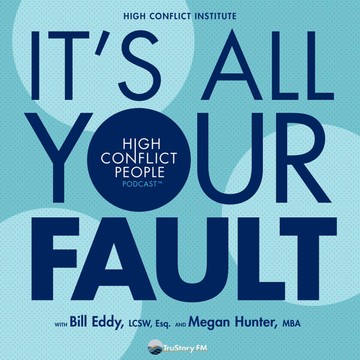
Sep 1, 2022 • 38min
REBROADCAST: Using BIFF Responses
Discover how to navigate hostile communications with high-conflict personalities using the BIFF method—Brief, Informative, Friendly, and Firm. Learn why emotional responses can escalate disputes and the importance of composing yourself during tense interactions. Delve into the power of empathy in communication, and why avoiding unnecessary apologies can lead to more productive dialogues. Explore practical strategies to transform misunderstandings into constructive conversations, helping you manage conflict in everyday situations.
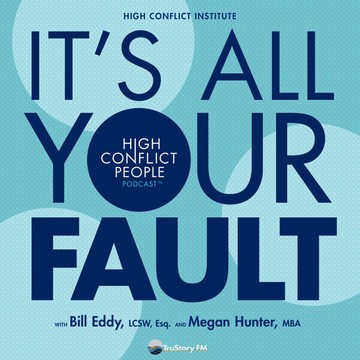
Aug 25, 2022 • 40min
REBROADCAST: High Conflict Emotion Contagion
REBROADCASTThe challenge of being emotional creaturesDid you know that emotions are contagious? We like to think we are in complete control of our emotions, but lots of research shows that emotions are contagious and it’s how we handle our own emotions once we’re emotionally hooked.In this episode we’ll break down emotion contagion. If you’re a brain nerd like us, or you simply want to have a better understanding of human behavior and the impact of unmanaged emotions on others, you’ll enjoy this episode. Specifically, we’ll discuss:Can you get emotionally “hooked?” and “unhooked?”How exactly are emotions contagious? How does that work in our brains?Can emotions lead us to make bad decisions?How do High Conflict People deal with emotions?How do High Conflict People communicate differently using their emotions?Are emotions part of why we have such angry polarization today in families and in politics?What can we do to calm down emotionsLinks & Other NotesBOOKSBIFF for everyoneBIFF for Coparent CommunicationBIFF for WorkplaceCalming Upset People with EARON DEMAND COURSEThe Brain 101: For Lawyers & AnyoneWho Are High Conflict People?ARTICLESManaging EmotionsKeep the Conflict Small! (With Managed Emotions)Submit a Question for Bill and MeganAll of our books can be found in our online store or anywhere books are sold, including as e-books.Note: We are not diagnosing anyone in our discussions, merely discussing patterns of behavior.
(00:00) - Welcome to It's All Your Fault
(01:42) - Emotionally Hooked & Unhooked
(05:22) - Getting Hooked
(07:16) - Emotional Persuasion
(13:13) - In the Brain
(21:33) - Emotions Leading to Bad Decisions
(24:48) - HCPs Dealing With Emotions
(27:57) - Communicating with Emotions
(29:23) - Polarization
(34:40) - Calming Emotions
(36:46) - Reminders & Coming Next Week: HCPs in Love
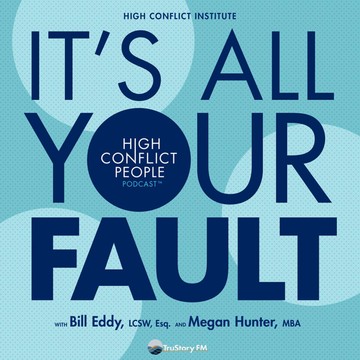
9 snips
Aug 18, 2022 • 30min
REBROADCAST: Part 2: Borderline Personality Disorder for Family Members
Amanda Smith, a licensed clinical social worker and BPD expert, shares essential insights for families of those with Borderline Personality Disorder. She discusses common emotional reactions and emphasizes the importance of self-care for loved ones. Amanda advises on setting healthy boundaries and utilizing planned separations for relationship resets. She elaborates on the role of therapy, both individual and couples, while cautioning against blunt labeling of BPD. Ultimately, she offers hope for recovery and healing by combining empathy with necessary limits.
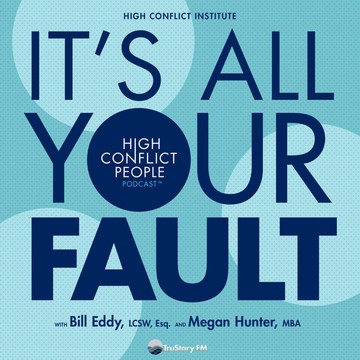
Aug 11, 2022 • 44min
REBROADCAST: Narcissistic High Conflict People
REBROADCASTWhen an HCP is a Narcissist...Do you know someone whose moods swing wildly? Do they act unreasonably suspicious or antagonistic? Do they blame others for their own problems? When a high conflict person (HCP) has one of five common personality disorders – borderline, narcissistic, paranoid, antisocial, or histrionic – they can lash out in risky extremes of emotion and aggression. And once an HCP decides to target you, they’re hard to shake.Most everyone has been around a narcissist, but not everyone understands how to handle a narcissistic HCP. Bill and Megan do a deep dive into this personality type, exploring:Their fear-based need to be superior and makes others feel inferiorThe differences between vulnerable, narcissistic and malignant typesWhy they see themselves as a hero and protector while those around them experience them as bulliesHow to spot themStatistics on Narcissistic Personality Disorder and narcissistic HCPs in the U.SUnderstanding and dealing with Narcissistic HCPs come in layers, and understanding the why they behave that way is the first step.If you’ve been the Target of Blame for a narcissistic HCP, you know the devastating impact it can have. It’s easy to get emotionally hooked by their aggressive behaviors and respond with aggression or avoidance, which emboldens them. Instead, learning the necessary skills –that don’t always feel natural – is the ticket to managing interactions with them. The first step is to understand their behavior patterns, starting now.Send us your stories!We’d love to hear your stories so we can talk through them on the show! Please visit our site and click the ‘Submit a Question’ button at the top of the page. You can also send us an email at podcast@highconflictinstitute.com or send us a note on any of our socials.Please rate, review and share this show!Links & Other NotesBooks:BIFF at Work5 Types of People Who Can Ruin Your Life: Identifying and Dealing with Narcissists, Sociopaths, and Other High-Conflict PersonalitiesIt’s All Your Fault: Managing Narcissists and Other High Conflict PeopleAll of our books can be found in our online store or anywhere books are sold, including as e-books and some in audio format.Training:For attorneys: Dealing with Narcissistic Personalities: The Arrogant Players of DivorceThe Narcissistic Family Member: Prickly and SuperiorArticles:Do Narcissists Make Good Leaders in Business?Narcissism and Incivility: Is There a Connection?Narcissist in Your Family? 4 Tips for Dealing with ThemSubmit a Question for Bill and MeganYou can also find these show notes on our website as well.
(00:00) - Welcome to It's All Your Fault
(01:45) - Last Time...
(02:10) - HCP Refresher
(05:05) - The Narcissistic HCP
(07:38) - Statistics
(08:53) - Dealing With an Narcissistic HCP
(09:57) - Sexual Abuse
(10:21) - Genetic Component?
(12:47) - Empathy Factor
(14:57) - How They See Themselves
(17:44) - Types of Narcissists
(23:55) - Lack of Self-Awareness
(26:06) - Treatment
(28:59) - Dealing With a Narcissistic HCP in Your Life
(32:26) - Getting Support
(33:39) - Gender Breakdown
(35:17) - Don't Tell Them They're an HCP
(36:03) - Narcissists vs. Narcissistic HCPs
(36:49) - Are HCPs bad people?
(39:00) - Raising Healthy Kids
(42:05) - Reminders & Coming Next Week: Antisocial HCPs
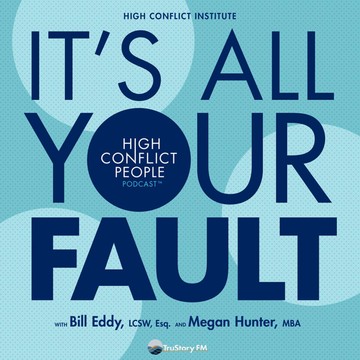
10 snips
Aug 4, 2022 • 34min
REBROADCAST: Who Are High Conflict People?
Discover the traits of high conflict personalities, from blazing accusations to extreme emotional reactions. Learn how these individuals often deflect blame and why their behavior can be predictable with the right insights. This episode dives into the psychological foundations of these personalities, discussing genetics, upbringing, and cultural influences. Gain practical tools like EAR statements—Empathy, Attention, Respect—to effectively engage with HCPs, helping to diffuse tension and promote understanding in challenging interactions.


